Cleaning vinyl floors using a vacuum is an excellent method to eliminate dirt, dust, and debris. Use a soft brush or a cleaner specifically for hard surfaces to prevent scratches. Continue reading to know exactly if you can vacuum vinyl floors.
Can You Vacuum Vinyl Floors?
Cleaning vinyl floors using a vacuum is an excellent way to eliminate dirt, dust, and grime. To prevent scratches, it is advised to use a soft brush cleaner. You can also use a cleaner made especially for hard surfaces.
What Kind Of Vacuum Do You Use On Vinyl Floors?
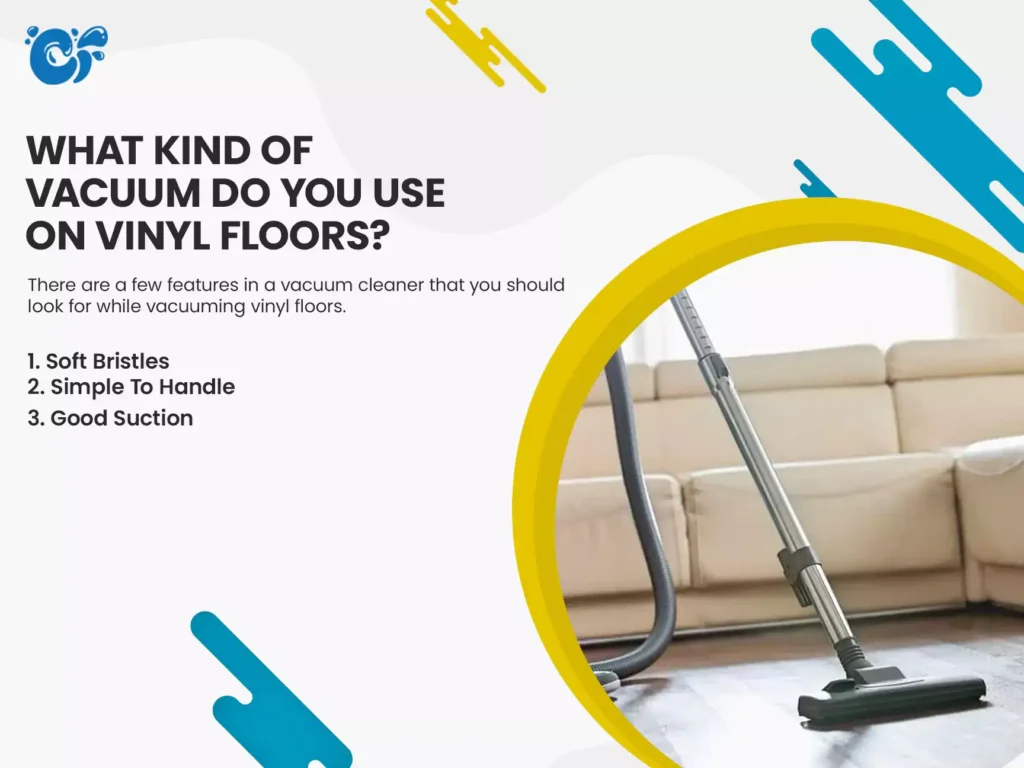
There are a few features in a vacuum cleaner that you should look for while vacuuming vinyl floors.
Soft Bristles
To begin with, check to see if the vacuum cleaner has gentle bristles. By doing this, the vinyl will not get scratched or harmed.
Simple To Handle
Make sure that operating the vacuum is simple. This will ease the strain of mopping the floor.
Good Suction
Ensure that the vacuum cleaner has good suction. Consequently, your floors will remain tidy and free of dirt and trash.
You might also like: How To Clean Basement Walls
How To Clean Your Vinyl Plank Flooring With A Vacuum?
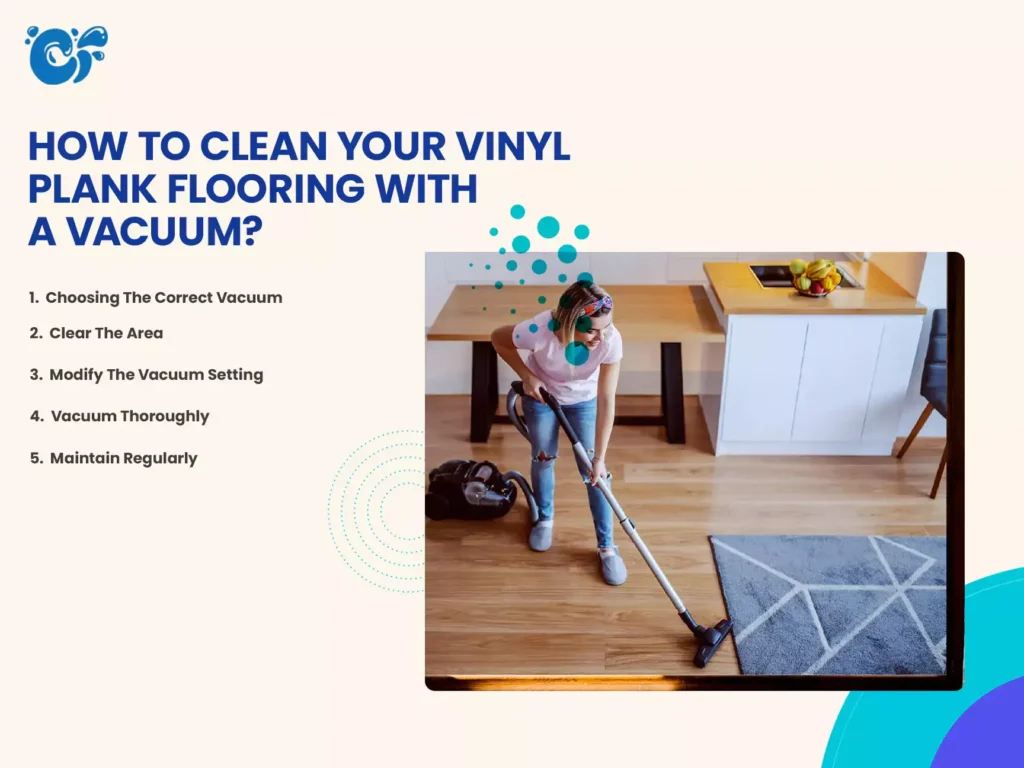
Here is a step-by-step how-to for vacuuming vinyl flooring:
Choosing The Correct Vacuum
Utilize a vacuum cleaner made especially for hard floors or other similar surfaces. Your vinyl tile floor won’t be scratched as a result.
Clear The Area
Remove any obstacles or loose debris from the floor before vacuuming. This makes sure the vacuum can clean the surface thoroughly.
- Modify The Vacuum Setting
Set the vacuum cleaner to the appropriate setting for hard floors, or, if required, attach a soft brush. These modifications won’t harm your vinyl floor. - Vacuum ThoroughlyStart vacuuming the vinyl floor in the corner of the room and working your way out. To remove dirt and debris from the exhaust system, gently shake the system.
Pay attention to edges and corners; this will ensure a thorough cleaning. Maintain Regularly
To stop dirt and grime from accumulating, clean your vinyl floor. This increases its lifespan and helps keep it clean.
Self-cleaning is an excellent thing. However, we advise hiring Clean Freak OC to do your task. In this manner, your task will be completed flawlessly, providing you with a tidy home.
How To Clean Waterproof Vinyl Plank Flooring
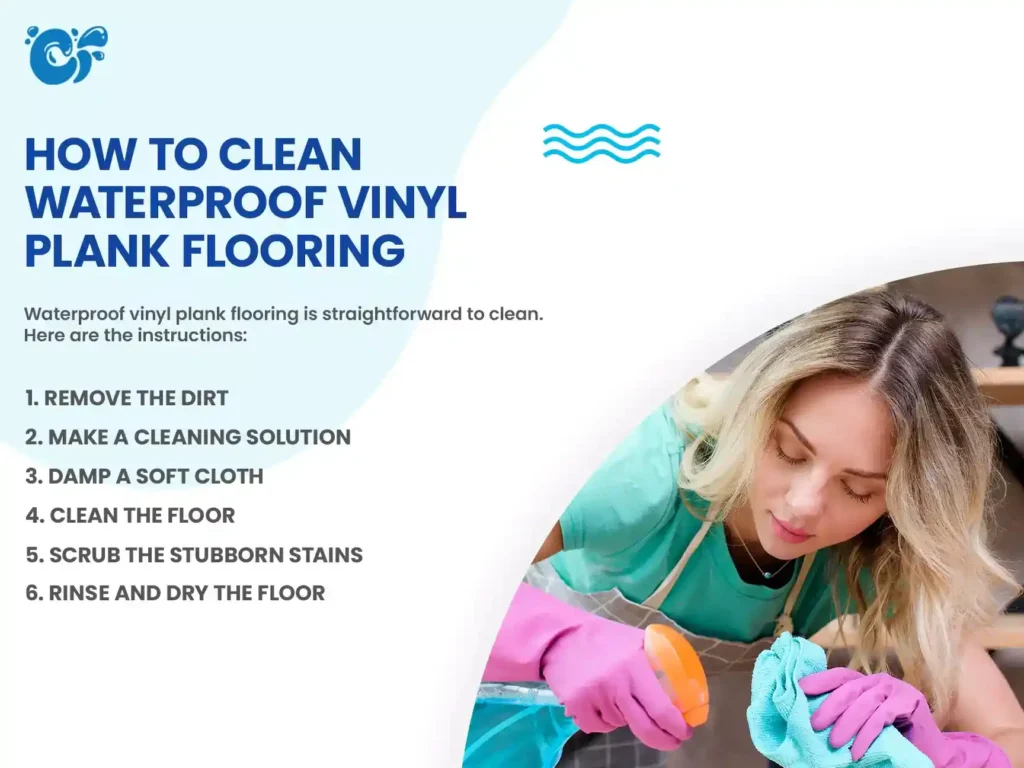
Waterproof vinyl plank flooring is straightforward to clean. Here are the instructions:
-
Remove The Dirt
First, sweep or mop the floor to remove dirt, dust, or other debris. This guard against cleaning-related scratches.
Make A Cleaning Solution
A light cleaning solution can be created by dissolving a few drops of vinyl floor cleanser or mild dish soap. Mix them in a pail of warm water. Avoid using harsh or abrasive chemicals since they might harm the floor.
Damp A Soft Cloth
Make sure the mop or soft cloth is only moist. It should not be completely saturated with the cleaning solution. Too much water can leak into the seams and edges and harm things.
Clean The Floor
Use a wet towel or mop to clean the waterproof vinyl plank flooring gently. Work in small sections back and forth. Make sure not to leave the floor wet.
Use only a little cleaning solution on the surface. You can also hire a professional janitor for the task.You might also like: All You Need To Consider About Janitorial And Custodial Services.
Scrub The Stubborn Stains
You can use a more robust solution or a vinyl floor cleaner specifically designed for vinyl flooring for tough stains or cracks. Use a brush or soft cloth to apply the detergent directly to the color and gently massage it.
Rinse And Dry The Floor
When you’re done cleaning, wipe everything down thoroughly with a mop or towel and then rinse with fresh water. It must dry rapidly and without excessive humidity.
You might also like: All You Need To Consider About Janitorial And Custodial Services.
What Should You Not Clean Vinyl Plank Flooring With?
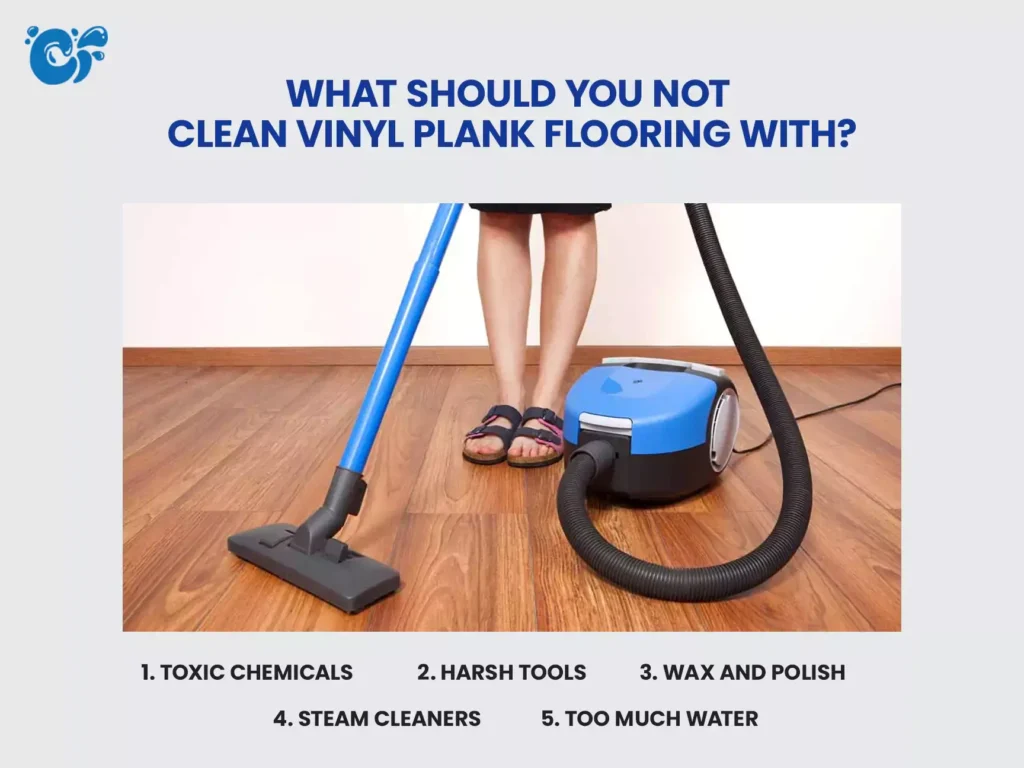
When cleaning vinyl floors, it is essential to avoid specific cleaning tools and equipment that can damage the surface. Here are some things you should not use to clean vinyl floors:
Toxic Chemicals
Do not use strong cleansers that contain abrasives, bleach, or ammonia. These may result in the protective vinyl covering being discolored or possibly getting damaged.
Harsh Tools
Avoid using standard cleaning tools, such as a harsh brush or bristles. They risk causing permanent damage by scuffing or scratching the vinyl’s surface.
Wax And Polish
There is no need for wax or polish since vinyl tile floors are utilized to preserve or finish other surfaces. The use of these compounds can result in erosion or residue.
Steam Cleaners
Steam cleaners generate a lot of heat and moisture. It can seep into vinyl flooring’s seams and edges and cause warping or expansion. On vinyl floors, stay away from steam cleaners.
Too Much Water
Despite the waterproof nature of vinyl plank flooring, it is still advisable to avoid too much water. Don’t flood the floor with water or soak it. The glue may become loose, or the seams may get damaged if too much moisture is present.
These errors are rather typical. Let the professionals handle the task to prevent these problems is advisable.
What Not To Do With Vinyl Floors
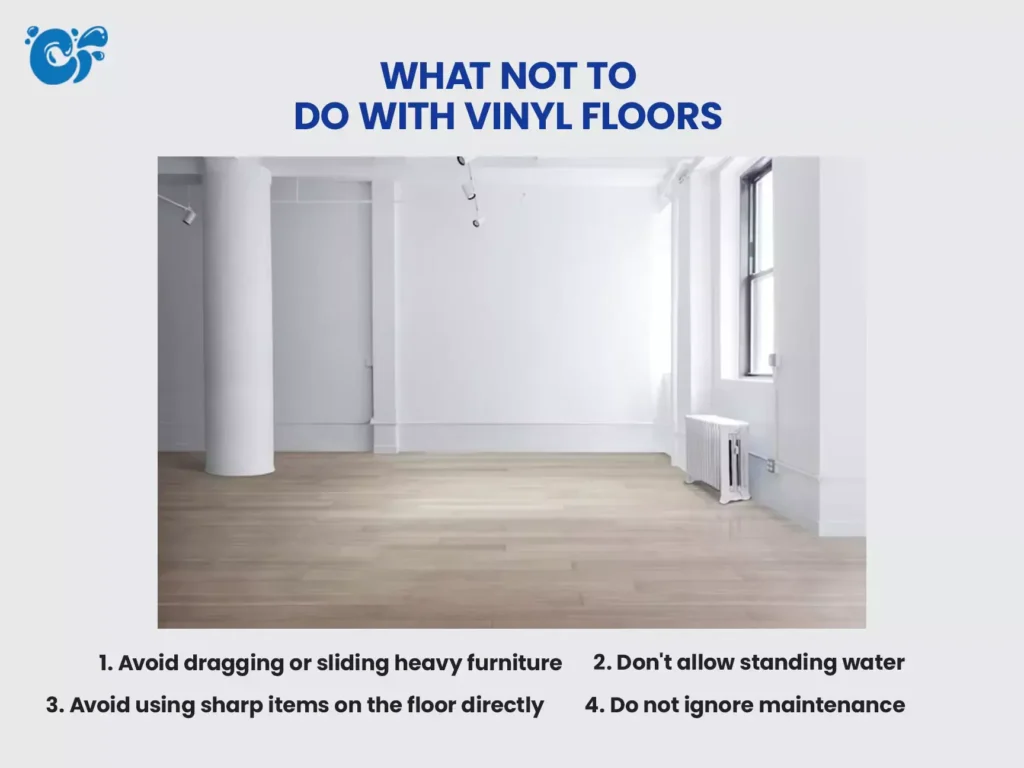
Here are a few specific things to refrain from doing while using vinyl flooring:
Avoid dragging or sliding heavy furniture
On vinyl flooring, avoid dragging or sliding furniture or bulky objects. This can damage or harm the surface. Build a table or use furniture-making supplies.
Don’t allow standing water
Vinyl flooring is waterproof. But, prolonged contact with standing water can cause the glue to become damaged or removed. This happens when water seeps into seams and corners. Spills should be cleaned up as a way, and you should limit your water usage when cleaning.
Avoid using sharp items on the floor directly
Avoid using sharp heels or shoes that can pierce or scratch the vinyl. You can place doormats at entrances to trap dirt and prevent harm.
Do not ignore maintenance
Regular maintenance is needed for vinyl tiles. Proper floor cleaning practices are essential to prevent dust and preserve the surface’s beauty. This means sweeping and mopping should be considered.
What Is The Disadvantage Of Vinyl Flooring?
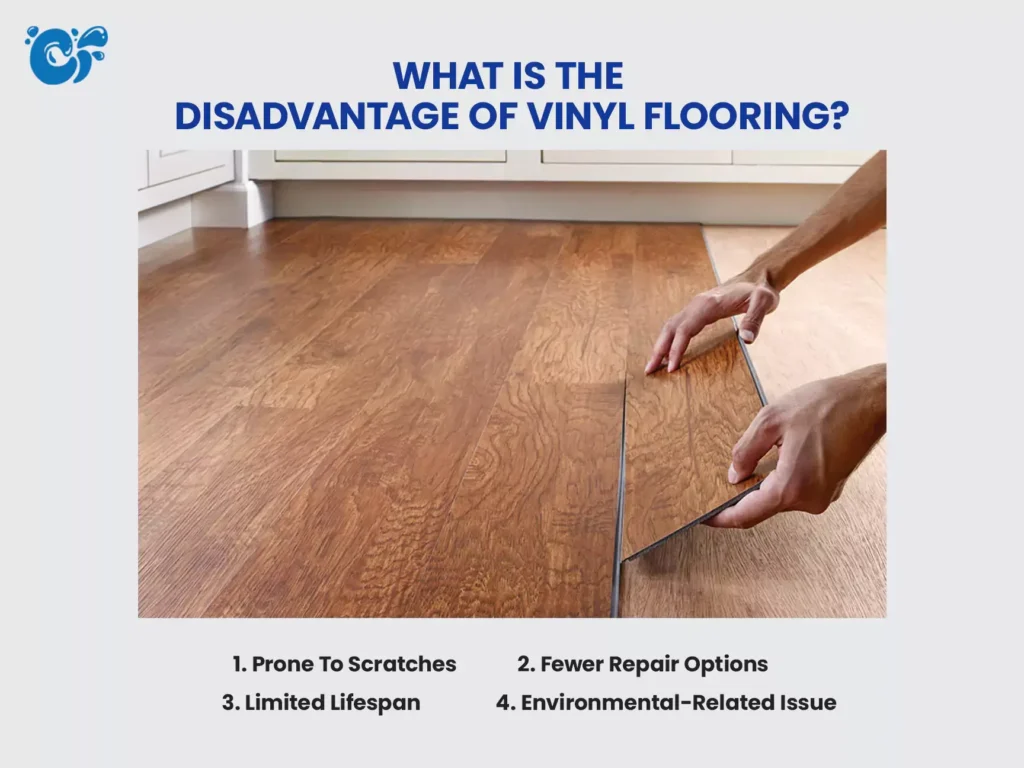
While vinyl flooring has advantages, there are also some disadvantages. Here are a few to consider:
Prone To Scratches
When heavy furniture or sharp items scrape the surface of vinyl flooring, they are more likely to sustain scratches and dings. To prevent such behaviors, caution should be used.
Fewer Repair Options
It might be challenging to repair or replace just one broken vinyl tile. It can only be replaced without affecting the appearance of the entire installation. Large portions or complete flooring can need to be replaced because of this.
Limited Lifespan
Vinyl flooring has a shorter lifespan than other types, such as hardwood or tile. It could need to alter more quickly, particularly in locations with lots of traffic.
Environmental-Related Issue
Polyvinyl chloride, a kind of plastic, is used to create vinyl flooring. Some people worry about how creating and discarding PVC will affect the environment.
Conclusion
In conclusion, vinyl flooring can be vacuumed. For getting rid of dust and grime, it is secure and efficient. Only use a vacuum cleaner made for hard floors to prevent scratching the vinyl.

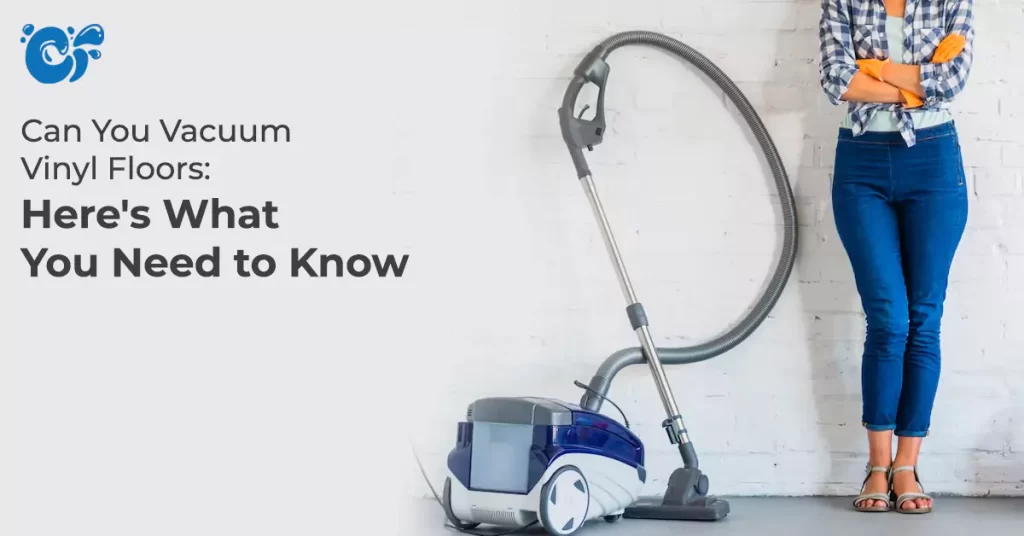

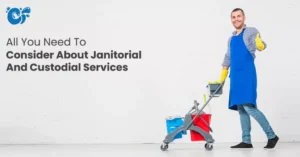
0 Responses
Yes, We Do.